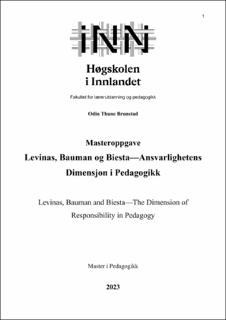Levinas, Bauman og Biesta—Ansvarlighetens Dimensjon i Pedagogikk
Master thesis
Permanent lenke
https://hdl.handle.net/11250/3077260Utgivelsesdato
2023Metadata
Vis full innførselSamlinger
Sammendrag
Denne masteroppgaven tar for seg problemstillingen: Hvordan kan Levinas’ filosofi bidra til en dypere forståelse av pedagogikk, og hvordan kan Gert J. J. Biesta og Zygmunt Baumans perspektiver utvide denne forståelsen? Målet er å undersøke Emmanuel Levinas’ fundamentaletikk og konsept om etisk ansvarlighet, og vurdere dets betydning og anvendelse i pedagogikk og utdanning. Gjennom en grundig analyse av Levinas’ magnum opus Totalitet og Uendelighet (1961/2020), samt andre sentrale utgivelser, vil oppgaven utforske de mest relevante aspektene ved hans filosofi for pedagogiske sammenhenger. Oppgaven vil introdusere tre reaksjoner forfatteren har på samfunn, institusjoner og på relasjoner i dagens postmodernitet. Det vil hevdes at alle disse grunner i en etisk krise, som et utfall av en fragmentert postmodernitet og at det er et behov for en alternativ tilnærming til etikk. Deretter vil de mest sentrale aspektene ved Levinas’ etiske filosofi bli gjort rede for, med vekt på subjektivitet, ansvarlighet og pluralisme. Deretter undersøkes Gert J. J. Biestas pedagogiske arbeider og hvordan han anvender Levinas’ filosofi for å fremme etisk ansvarlighet og intersubjektivitet i pedagogiske praksiser. Biestas tilnærming vil bli presentert og kritisk vurdert, med særlig fokus på hans integrasjon av Levinas’ konsepter i sitt pedagogisk-filosofiske rammeverk. Videre vil oppgaven se nærmere på Zygmunt Baumans sosiologiske filosofi og hvordan denne inkorporerer Levinas’ idéer for å beskrive samfunnets etiske utfordringer, muligheter og alternativer for videreutvikling. En sammenligning av Baumans og Biestas tilnærminger til Levinas vil bli utført. Det vil bli argumentert for at Bauman har en mer holistisk tilnærming til Levinas enn Biesta. Til slutt vil oppgaven diskutere hvordan en kombinasjon av Biestas og Baumans perspektiver kan gi en fruktbar plattform for videre utforsking av etikk i vår postmodernitet. Spesielt vil konseptene etisk ansvarlighet og intersubjektivitet i samfunn og utdanningsinstitusjoner bli vurdert i lys av dere felles engasjement med Levinas’ filosofi. This master’s thesis adresses the research question: How can Levinas’ philosophy contribute to a deeper understanding of pedagogy, and how can Gert J. J. Biesta and Zygmunt Bauman’s perspectives expand this understanding? The aim is to examine Emmanuel Levinas’ fundamental ethics and the concept of ethical responsibility, and assess their significance and application in pedagogy and education. Through a thorough analysis of Levinas’ magnum opus Totality and Infinity, as well as other key publications, the thesis will explore the most relevant aspects of his philosophy for pedagogical contexts. The thesis will introduce three reactions the author has to society, institutions, and relations in today’s postmodernity. It will be argued that all of these reasons stem from an ethical crisis as a result of a fragmented postmodernity, and that there is a need for an alternative approach to ethics. Subsequently, the most central aspects of Levinas’ ethical philosophy will be explained, with emphasis on subjectivity, responsibility, and pluralism. Next, the thesis will examine Gert J. J. Biesta’s pedagogical works and how he applies Levinas’ philosophy to promote ethical responsibility and intersubjectivity in pedagogical practices. Biesta’s approach will be presented and critically assessed, with particular focus on his integration of Levinas’ concepts in his pedagogical-philosophical framework. Furthermore, the thesis will look into Zygmunt Bauman’s sociological philosophy and how it incorporates Levinas’ ideas to describe society’s ethical challenges, opportunities, and alternatives for further development. A comparison of Bauman’s and Biesta’s approaches will be carried out, arguing that Bauman has a more holistic approach to Levinas than Biesta. Finally, the thesis will discuss how a combination of Biesta’s and Bauman’s perspectives can provide a fruitful plattform for further exploration of ethics in our postmodernity. Specifically, the concepts of ethical responsibility and intersubjectivity in society and educational institutions will be assessed in light of their shared engagement in Levinas’ philosophy.
